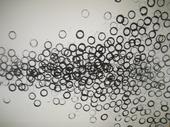The last post (see below) discussed being and its presence in philosophy. In that post, I suggested that being is potent when it symbolizes the mystery of being alive and its wonderment. Here, I wish to offer up being as the canvas or paper upon which words depend in order to exist. On this canvas sound can become words. Out of my body, I can emit vocalizations, “Aaaa! Aaaa! Aaaa!” which, with the help of tongue and mouth can become “Lover! Forest! Running!” They can become, “Anguish! Ecstasy! Grief!” They can become words. In sign language, the hands become a tongue and mouth and words become visually heard. Words are a type of language. Language can be seen as a bridge – anything that expresses or communicates, connecting us to another. The design of a city is a language, the design of an art piece is a language. The design of a mathematical equation is a language. Gestures, facial expressions, touch, energy are language in action.
Simultaneously, language can refer more specifically to vocal communication. The word “language” comes from the Latin word for “tongue” – we can see this link more evidently in the Romantic languages more so than in English – tongue is “la lengua” in Spanish and “la langue” in French. The tongue shapes the sounds our vocal chords emit into different identities. And these sounds can hold meaning for the speaker and for those who hear. But from where does this meaning come? Do the sounds themselves carry a “meaning”? If we think of meaning as sensation and sensation as sentiment, yes! Fire. . . ffffffiiiiiiirrrrrre feels warm, hot, cozy, terrifying. The words can carry felt experiences. And when I say “fire,” I bring into my body the external experiences of witnessing fire. From within, I can say and/or think “fire” with no fire present, it multiply-exists as a concept, or an idea, as well as an event, as well as a word, as well as countless felt experiences.
Words can rest together in patterns and in relationships to each other. Noun, verb, adjective. Subject, verb, predicate. We paint these relationships onto canvas, onto being, and being holds them together. These relationships can go beyond the tidy relationships we have constructed as grammatically and logically correct, and the “meaning” can transcend the patterns, roles and definitions of the words that we have given them in rational discourse. This extravagance beyond the rules is being and is the work of poets and other writers who “smith” words to allow more sensations and often, paradoxical meanings to come through them.
Smithing can be playing with words and letters out of context, writing their irregularities, irreverently wedding them or maniacally repeating them or unpredictably dividing them – any act that allows words to include in their multi-tasking the allowance of a fleeting revelation, an elusive epiphany to be felt for a moment. Words, are after all, not only bridges to “understanding” but also bridges to the mysterious being of their canvas, as well as to each other. As well, they are bridges between humans and they are bridges forming (and at times wedding) my autobiographical selves living and dying in this body. We can fall into words, fall into being and swim and sink and rise to the top and float and swim and sink and rise to the top and float and swim and sink and rise to the top and float.
And through them, with them, we can feel alive miraculously.
